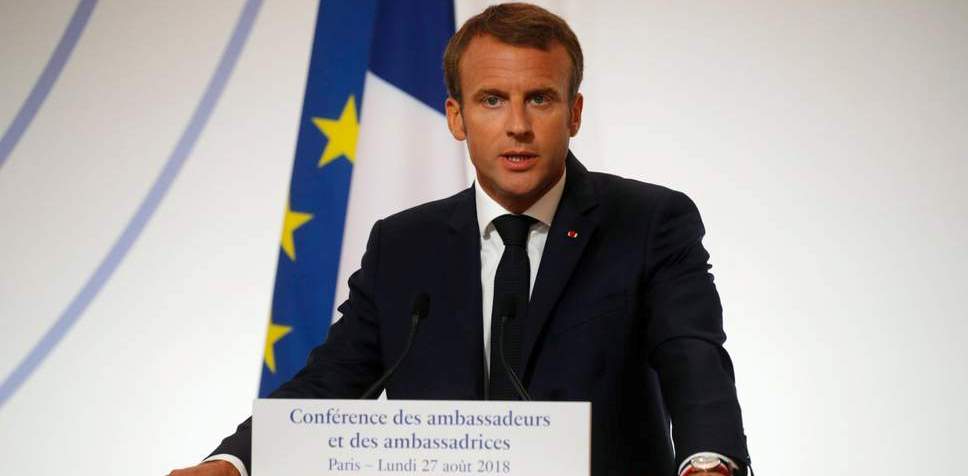Alwaght- French president Emmanuel Macron said on Monday Europe can no longer entrust its security to the US alone.
In a speech to ambassadors in Paris on Monday, an annual late-summer tradition for French presidents, Mr Macron said, "Europe can no longer rely on the United States for its security. It is up to us to guarantee European security," France 24 reported.
He said discussions on defense cooperation should include all European countries and Russia, on condition progress is made with Moscow on Ukraine.
"I want us to launch an exhaustive review of our security with all Europe's partners, which includes Russia," the French president said.
Macron said he would unveil new proposals "in the coming months" for the European Union to boost its security, saying the bloc must stop depending on American might.
Trump has repeatedly called into question the Western alliance's core commitment to mutual defense, while complaining that the US spends too much on military support for Europe.
The French president, who will head to Denmark and Finland for a three-day trip from Tuesday hoping to shore up support for his EU shake-up, called for redoubled efforts to reform the bloc.
"We need to take new initiatives, build new alliances," he said.
"France wants a Europe which protects, even as extremism has grown stronger and nationalism has awoken," he said.
Macron's call for greater European military cooperation echoed recent comments by German Foreign Minister Heiko Maas who urged Europe to "take an equal share of the responsibility" and "form a counterweight" to Washington as Europe-US relations cool.
Writing in the Handelsblatt newspaper, on 21 August, Maas called for Europe to reshape its relationship with the United States, saying the two sides had been drifting apart even before Donald Trump’s presidency and urging the EU to play a bigger global role.
“The fact that distance between the two sides of the Atlantic has become politically wider is by no means solely due to Donald Trump,” Maas wrote
“The USand Europe have been drifting apart for years. The overlapping of values and interests that has shaped our relationship for two generations is decreasing.”
The German minister also said European countries need to establish payment systems independent of the US to save the Iran nuclear deal that was abandoned by President Donald Trump, German Foreign Minister Heiko Maas said.
"That’s why it is indispensable that we strengthen European autonomy by creating payment channels that are independent of the United States, a European Monetary Fund and an independent SWIFT system,” Maas wrote in the Handelsblatt business daily.
"Every day the deal is alive is better than the highly explosive crisis that would otherwise threaten the Middle East,” he added in the article.
The Belgium-based SWIFT global payment network that facilitates the bulk of the world’s cross-border transactions shut out Iran in 2012 after the United States and EU agreed to impose sanctions on the Islamic Republic over its nuclear activities.
The 2015 agreement between Iran and world powers, officially known as the Joint Comprehensive Plan of Action (JCPOA), lifted international sanctions. In return, Iran agreed to restrictions on its nuclear activities, increasing the time it would need to produce an atom bomb if it chose to do so. It has long denied having any such intent.
Since the implementation of the nuclear agreement, the International Atomic Energy Agency (IAEA) has confirmed Iran’s compliance with its obligations under the JCPOA in several reports.
Trump withdrew the United States from the deal - signed before he took office - in May, calling the agreement deeply flawed and imposing new sanctions earlier this month.
European powers have been scrambling to ensure Iran gets enough economic benefits to persuade it to stay in the deal. This has proven difficult, with many European firms wary of far-reaching US financial penalties.
Concerns about Donald Trump’s administration have been growing across the EU recently, moving many European officials to join a chorus urging for more unity and self-reliance.
Late in May 2018, the Austrian chancellor Sebastian Kurz told the Financial Times "The US has become more and more unreliable for us,” emphasizing “The most important thing is that Europe has to remain united".
The major transatlantic rift first emerged after Trump pulled out of the Paris climate agreement, and it only deepened after the US administration recognized al-Quds (Jerusalem) as Israeli regime’s capital, pulled out of the 2015 Iranian nuclear deal and imposed tariffs on aluminum and steel, which are due to come into force in June.
Trump’s transformational policy in the relations with the EU gradually fueled tensions between his administration and the European powers. He several times asked the French and German leaders, both being the face of EU leadership, to increase their share in NATO spending. In the past three months, Trump announced tariffs on European and other trade partners’ goods, formally sparking a trade war. As the opposite sides took retaliatory measures, the chasms even deepened as a result.



























